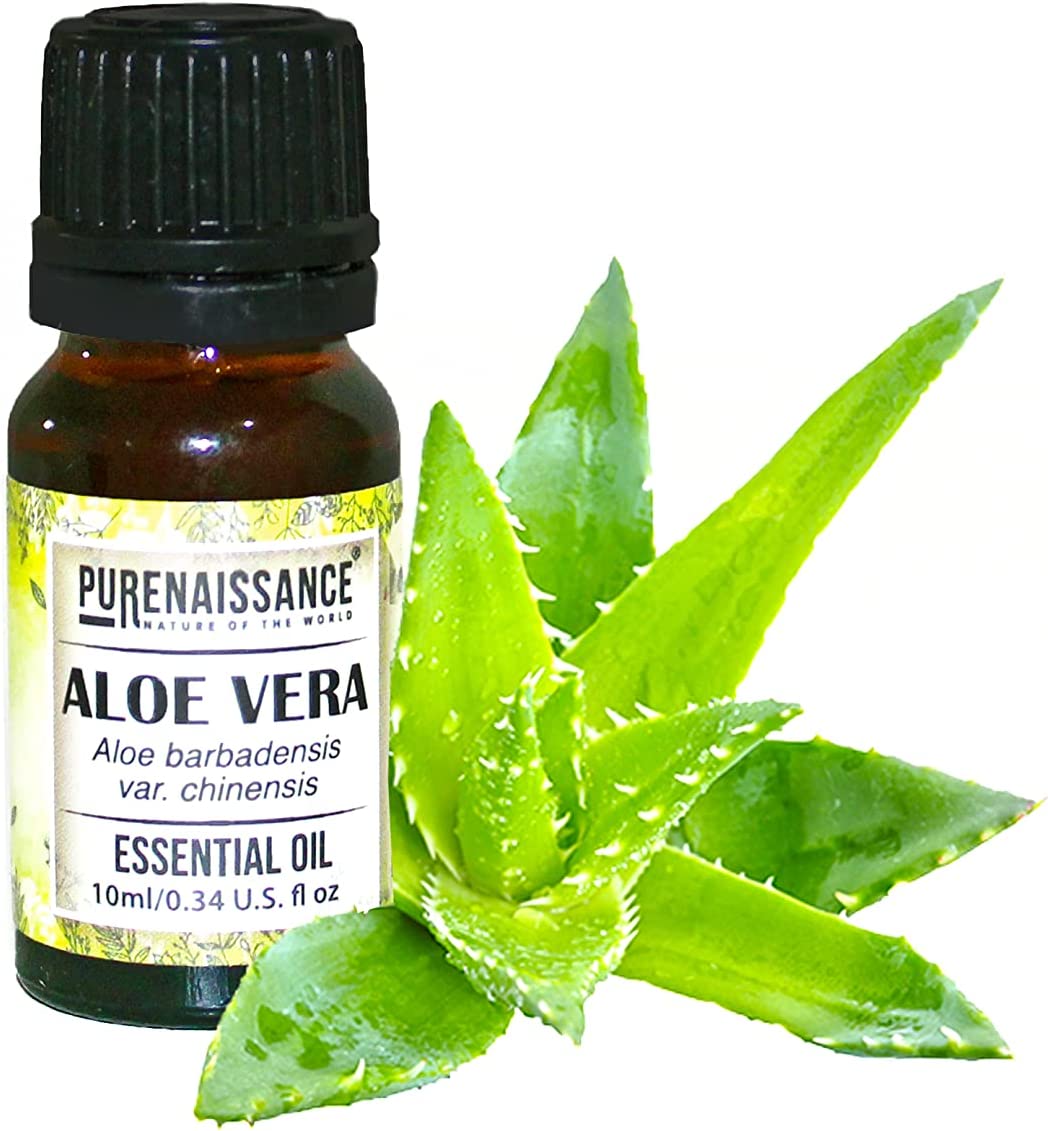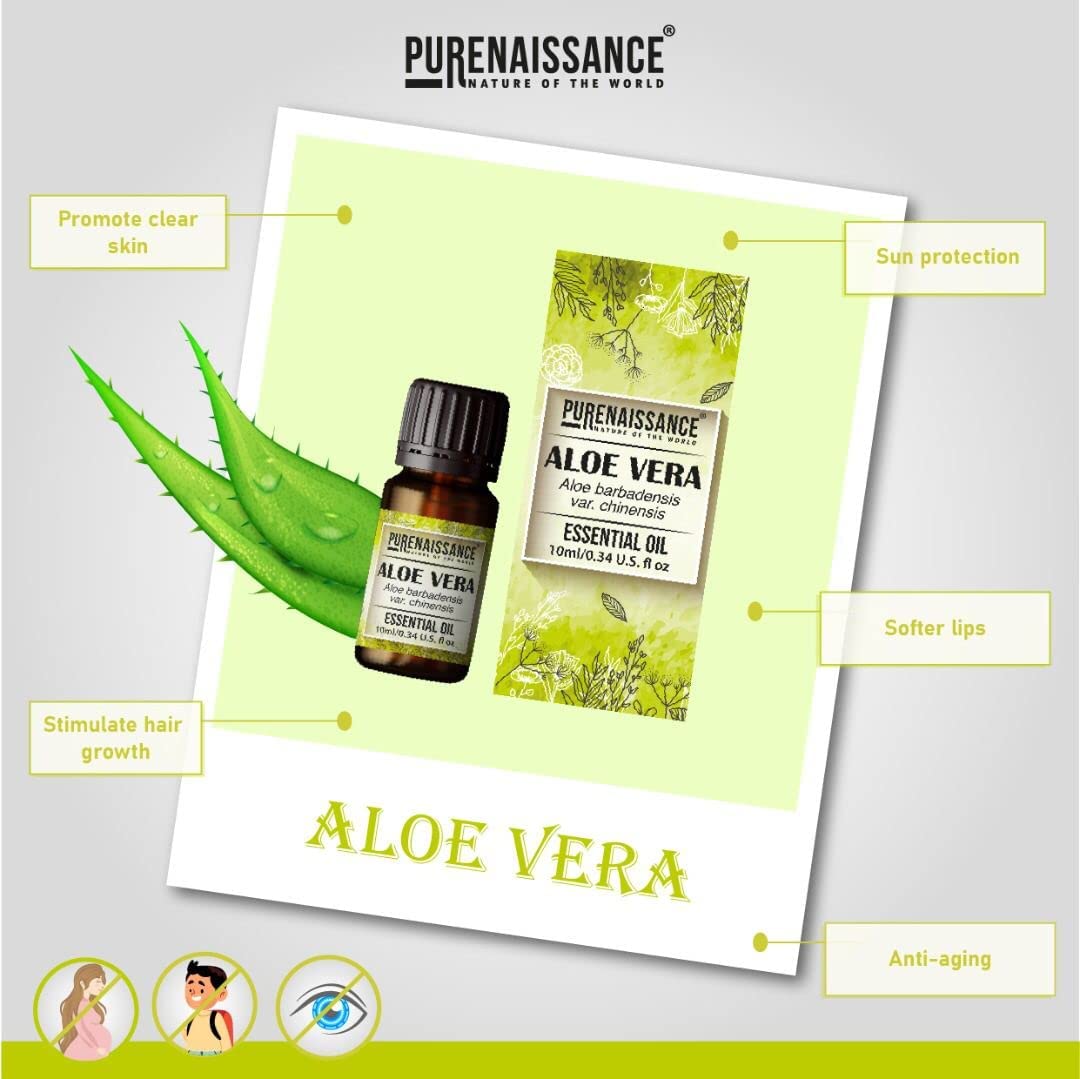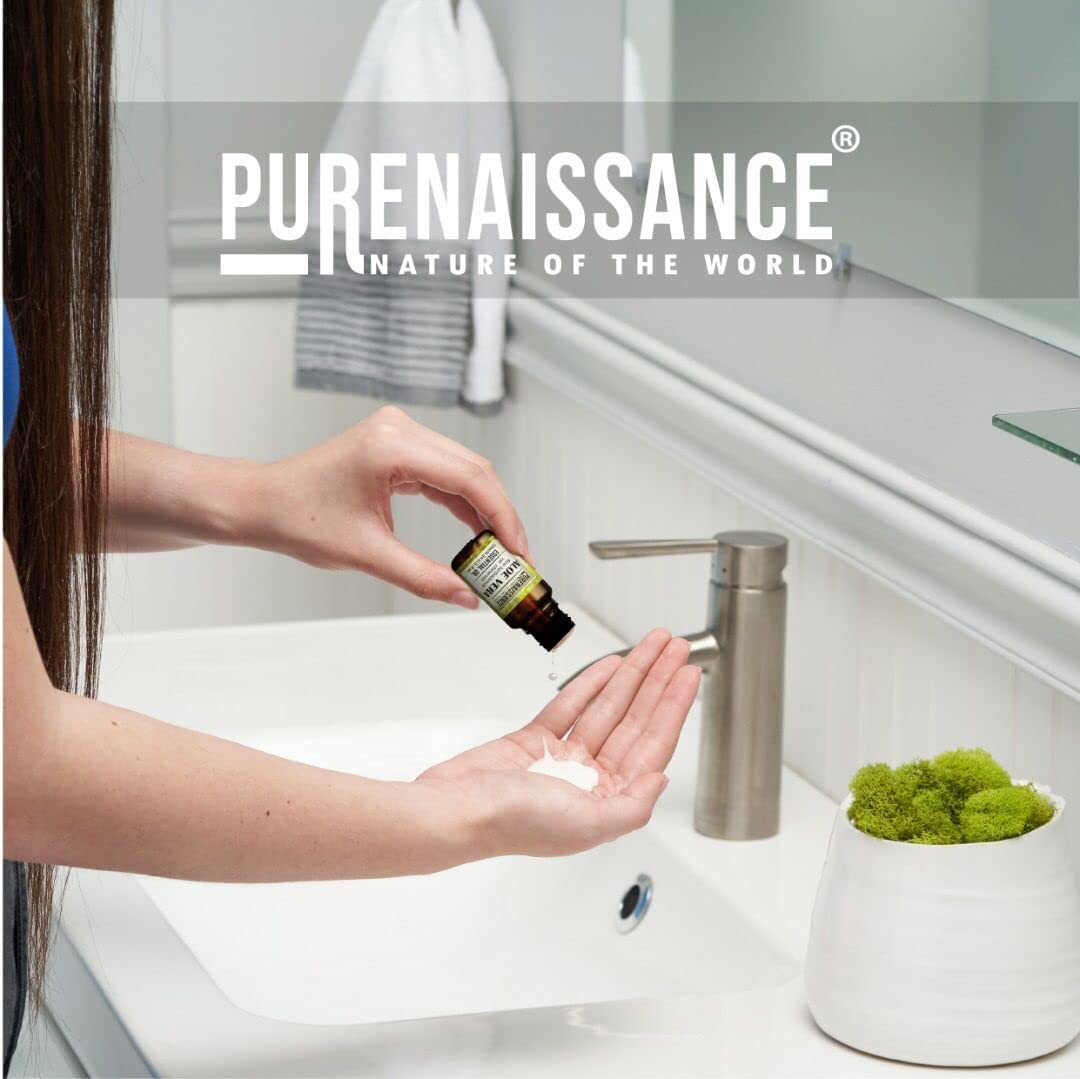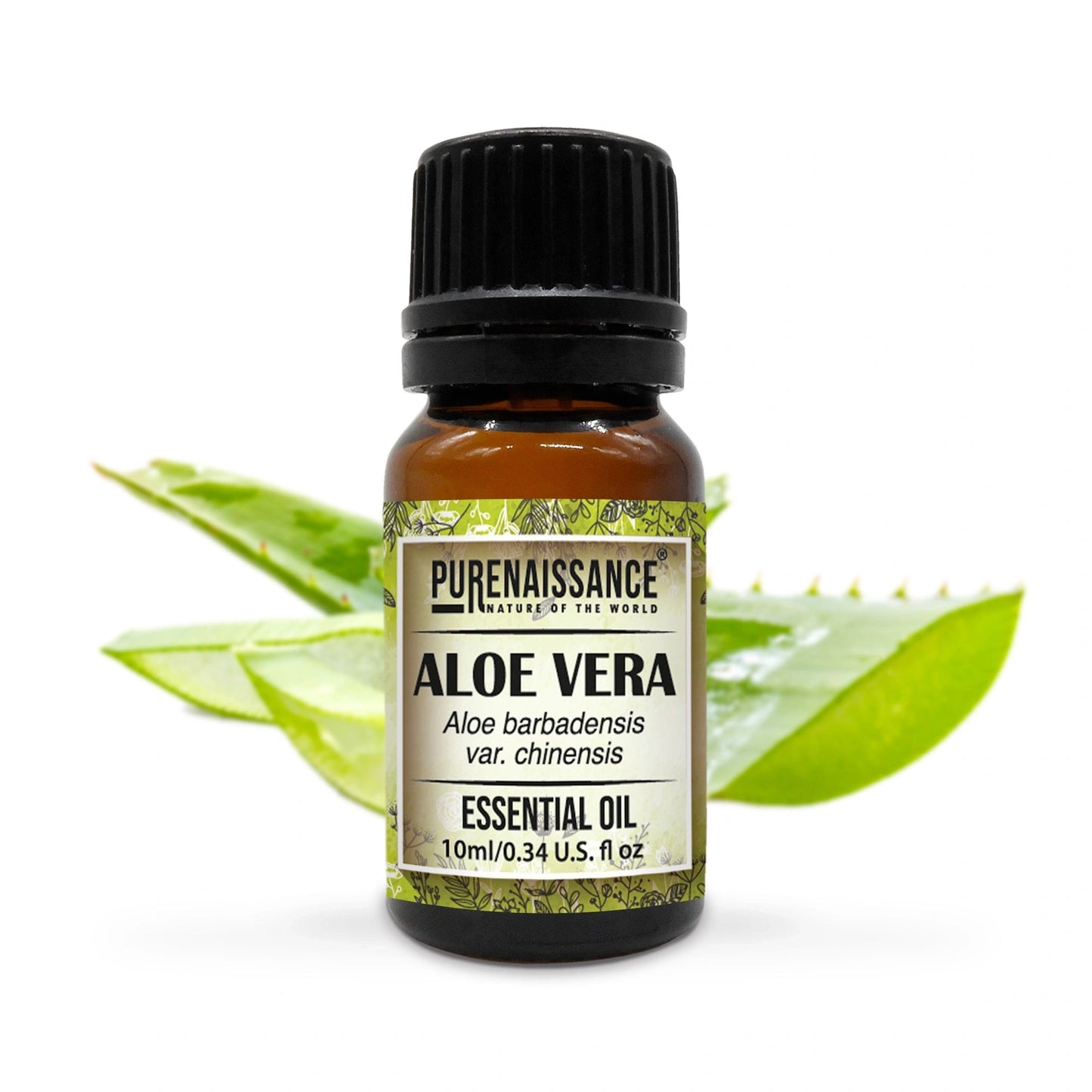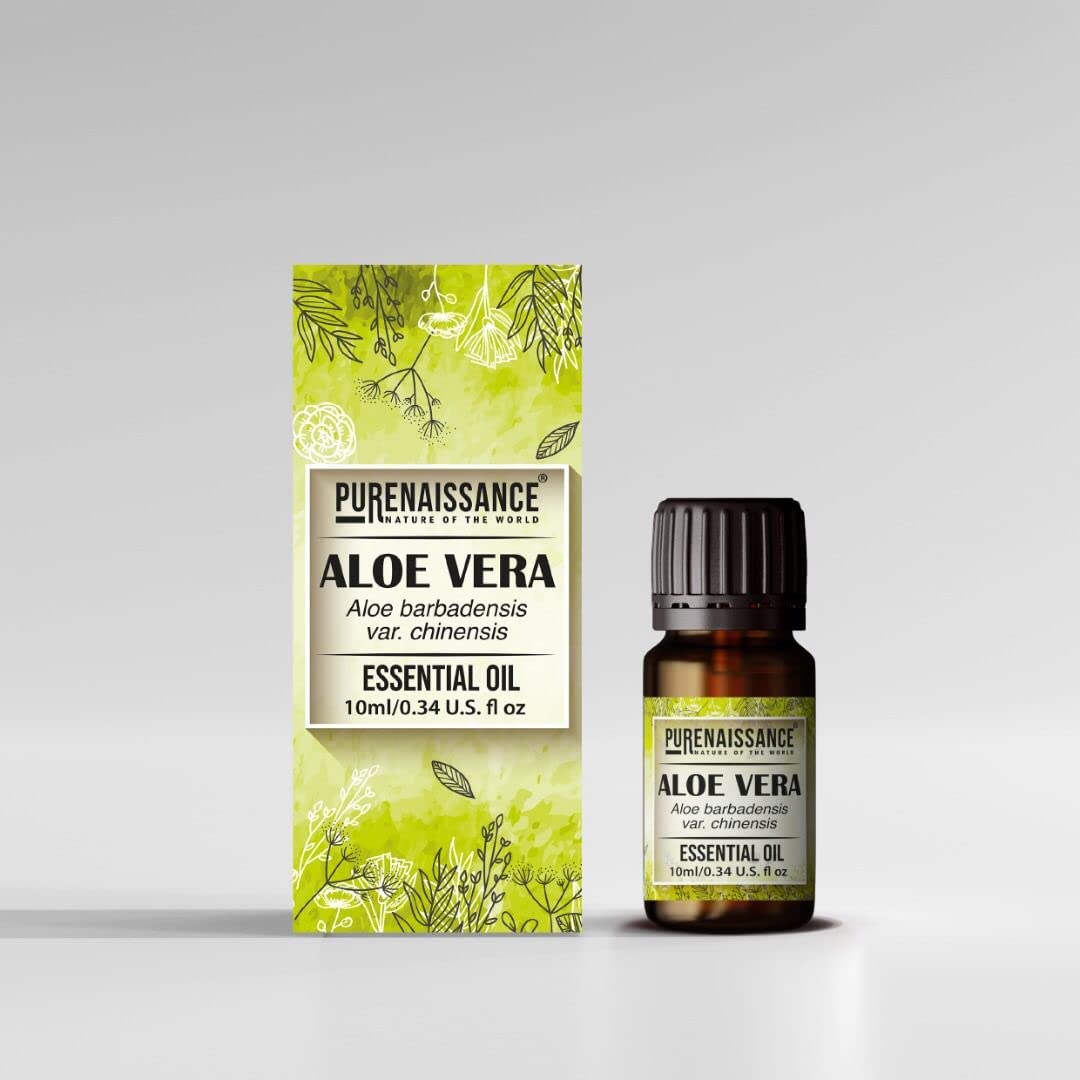Purenaissance
Pure Aloe Vera Essential Oil Purenaissance Therapeutic Grade . Best for Aromatherapy and Diffuser/10ml
Pure Aloe Vera Essential Oil Purenaissance Therapeutic Grade . Best for Aromatherapy and Diffuser/10ml
Couldn't load pickup availability
What is Aloe Vera Essential Oil: Aloe Vera is a perennial plant that grows in hot, arid environments. It is mainly found in North Africa, the Mediterranean region, Australia, and some areas in the United States. Studies show that Aloe Vera was an important component in herbal medicine. Aloe Vera oil is made from the gel of Aloe Vera plant. Aloe Vera has many health benefits when applied topically and also when used internally. It has been used as a medicinal plant for thousands of years for skin diseases, wounds and digestive complaints. Aloe Vera oil is obtained through a macerating process. They basically infuse Aloe Vera in a carrier oil for several weeks. In this process, the herbal gel is mixed with base oils like soybean, almond or apricot at higher temperature. The oil soaks up nutrients from Aloe Vera gel. After some time, it is filtered to remove out the plant components. This oil extraction technique is used for many herbal oils. The oil is used in many cosmetics such as face wash, body lotions, shampoos, hair gels, etc. Aloe Vera Essential Oil technical data Sheet: Botanical Name: Aloe barbadensis Oil. Family: Aloeaceae Appearance: Viscous oil Color: Pale yellow Odor: Slight vegetable Organ: Fresh leaves and leaf-juice Processing Method: Maceration Type: 100% Naturel Origin: Turkey Preferred uses: Dermal. Composition of Aloe Vera: Many of the beneficial compounds of Aloe Vera gel are transferred to the oil during its production stage. Nutrients you can obtain from the gel and oil include: Vitamins C, A (beta-carotene), E (alpha-tocopherol), B1, B2, and B6. Minerals: Iron, copper, magnesium, calcium, manganese, sodium, and potassium. Amino acids: There are 20 Amino acids in aloe oil. Anthraquinones, such as aloe Emodin, Aloin, and Cinnamic acid ester. Lipid compounds, such as Arachidonic acid, Gamma-linoleic acid and many phytosterols. Polysccharides (carbohydrate molecules). Physical characteristics: Specific Gravity: (25˚C) 0.870-0.884. Solubility in Water: Insoluble. Solubility: insoluble in Alcohol. Flash Point: 550˚ F. Boiling point/boiling range: 380°C. Storage Conditions: Handling: Keep away from ignition sources. Storage: Store in closed container away from heat and light. Properties of Aloe Vera Essential Oil: IN HEALTH: Anti-Inflammatory Anti – Bacterial Anti-Viral Anti-fungal Anti-oxidant IN BEAUTY: Cicatrizant Astringent Sun protection Moisturizer Indications of Aloe Vera Essential Oil: For the Skin: Soothing Burns: Aloe Vera is most often associated with after-sun products because lot of people use aloe Vera gel after being out in the sun to help soothe sunburns. The oil can be a good addition to homemade sunscreens. Eczema and Psoriasis: It can help add nutrients to the skin and clear up spots and rashes on your skin over time. Insect Bites: Because of its anti-inflammatory properties, Aloe oil helps relieve the itch and swelling from bug bites like bees, wasps, mosquitoes, and other bugs. For Cuts and Scars: Aloe oil can be very useful for wounds and cuts that have already begun to heal. Aloe oil may even help reduce the appearance of scarring by strengthening the collagen structure within the scar tissue. As a Facial Oil: Aloe oil isn't just for summer; it can be really helpful in the cold winter months when your skin gets really dry, and is especially good for those with oily, acne prone skin. For Beauty: For Aging Skin: Aloe oil can be a good addition to facial creams to keep your skin looking young. It helps reduce the appearance of facial wrinkles. For Acne: Aloe's antibacterial properties may help prevent acne in the first place, but its anti-inflammatory properties can also help reduce the swelling and redness caused by acne. For Hair Health: Aloe can help moisturize and nourish hair in a way that can make it healthier and give it a better texture. This can help prevent splitting and breakage of your hair, improving its appearance over time. For Health: Cold Sores: It can be useful to apply a small amount of Aloe Vera oil onto the cold sores. It aids the body in drying out the sores, like witch hazel. This prevents the blisters to weep and become more painful if used early on. This works because of the compound Aloe emodin, which has been proved to exhibit anti-viral effect against herpes virus. Dental Care: Aloe Vera nutrients can be useful for periodontal disease. One can use Aloe Vera oil as a massage oil for the gums and teeth to keep them healthy and lower the risk of dental problems like caries, plaque and gingivitis. For Well Being As a Massage: Aloe Vera oil is good as a massage oil. It feels mollifying to the skin and penetrates it well. The essential oils can be used with this oil as an aromatherapy massage. For Aromatherapy: This oil can have a soothing effect when distributed with an aromatherapy diffuser, and is known to reduce stress levels and headaches Tips for using Aloe Vera oil: SOFTER LIPS: Mix 1 tablespoon of rice flour with enough Aloe Vera oil to make a paste. Rub this homemade scrub on your lips gently for 5 minutes and then rinse it off with cold water. Use this lip scrub once a week. HAIR GROWTH: Gently massage the Aloe vera oil on your scalp and let it act overnight, you can also add a few drops of essential oil such as lavender oil to Aloe vera and use it for hair growth. The next morning, wash your hair with a mild shampoo. For better results, you can also repeat this up to two times a week. ANTI-AGING: In a bowl mix one teaspoon of ground oatmeal with ½ teaspoon water .Then add Aloe Vera oil gradually until you get a spreadable paste. Apply on your face and neck then wash off after half an hour. Precautions of Use of Aloe Vera Essential Oil: Aloe Vera oil is generally safe to be applied on the skin. However, it should not be ingested. Aloe Vera may contain some compounds that can be toxic in larger concentrations. It is massively important to choose an organic Aloe Vera oil as it does not contain added chemicals used during extraction process. If you use Aloe Vera oil, or Aloe Vera gel or juice may lead to diarrhea and gastrointestinal problems like nausea and vomiting. Some people may be allergic to Aloe Vera. They should avoid using Aloe Vera products as they can cause contact dermatitis on the skin. First Aid Measures: Inhalation: Remove victim immediately from source of exposure. Get medical attention if any discomfort continues. Ingestion: Rinse mouth and drink abundant water to dilute substance. Avoid vomiting, risk of aspiration. Skin Contact: Wash affected areas with a lot of water. Eye Contact: Immediately flush with plenty of water for up to 15 minutes. Remove any contact lenses and open eyes wide apart. Get medical attention immediately. Continue to rinse.
Share
